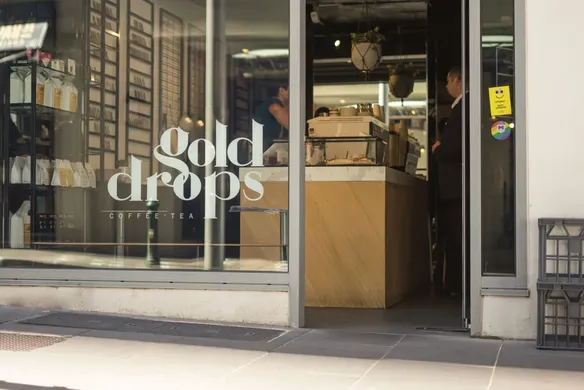Serving the perfect cup of coffee is big business in Australia. It’s our favoured morning pick-me-up and there is plenty of competition to prove it. We love the famed espresso here at Square and to celebrate we release spending insights each year on how Australians across the country are consuming their favourite beverages (catch our 2018 Square Australian Coffee Report here!)
In 2018, our numbers revealed that while the latte continues to dominate coffee orders across the country, there was also a noticeable shift emerging with a swing back to the old favourite cappuccino, along with a rise in low dairy options like the piccolo. Aside from flavour trends, we also revealed that for the first time the majority of Australians were now opting to pay for their coffees with card over cash, despite the low price tag.
To get some more insights into the $8 billion coffee industry that continues to dominate Australia’s taste buds, we recently caught up with Ari Abad, owner and head barista at Gold Drops, a specialty coffee hot spot in Australia’s coffee capital, Melbourne.
Tell us a bit about Gold Drops and how you got started.
We opened Gold Drops in October 2016. Melbourne is the coffee capital of Australia but we wanted to bring a unique offering to what was available, so we decided to open an all-natural shop where everything is ethically sourced in a bid to help the coffee industry remain sustainable.
What do Australians love about specialty coffee?
I think Australians really value that we have a true focus on providing the best possible product while sustaining the industry. In supporting us they are also supporting the livelihoods of the coffee farmers, as well as the baristas and independent shops.
Also, when it comes to coffee Australians are very savvy spenders, and because there is so much competition if you’re not giving them what they want they’ll go elsewhere, but they are willing to pay a bit more for a better quality product. I believe speciality coffee is like a craft beer, where customers are willing to pay more for a uniquely sourced product that is rare and has been made well.
What is one of the biggest trends you noticed last year that you think will continue in 2019?
Over the past year, we definitely saw an increase in filter or batch brew coffee, which is basically just black coffee. Twelve months ago we were only selling around two litres a day, but now we are easily getting through six to eight litres on average. I definitely expect this trend to continue to grow in 2019.
We noticed that more non-dairy milk alternatives are popping up on coffee menus across the country, is this something you think will change the industry?
Non-dairy milk alternatives, like almond or oat milk, have definitely been rising in popularity over the past few years. I think generally consumers are more health conscious theses days, and they aren’t as scared to cut things from their diet than they used to be. As an industry, we should be looking at new ways to incorporate these tastes into our brews so that we continue to deliver what people want.
Have you noticed the rise in popularity of customers opting to pay by card over cash?
Absolutely. Currently tap-and-go payments make up around 70-80% of our daily sales. Many customers used to use spare change for their morning coffee orders but now contactless payments systems, like Square, have made it so much easier and faster to order and pay that they are choosing the convenience of tap over coins.
There is a huge benefit here for business owners too, because the speed and efficiency of cashless payments, particularly during peak times, helps us serve more customers quickly and drive more sales. When you’re using a system like Square, you can also monitor all your daily sales and activity online or through your phone, so if you’re a business owner that is not in-store all the time you still know exactly what’s happening.
Do you think businesses are ready for Australia to become cashless?
There is no denying now that we are going to be a cashless society, and the fact that the majority of Aussies are willing to use their cards to pay for low price items like coffee, shows us that it’s probably going to happen sooner than later.
Like many businesses I know, we still accept all forms of payment but that is only because I know, particularly among certain demographics, people still carry and want to pay with cash. Being cashless makes more business sense to me because it’s more efficient. Transactions happen faster and there are less recording mistakes.
Do you think service providers, like Square, coming into the market have made a difference to the number of businesses going cashless?
For sure. Prior to operators like Square coming into the market, businesses had to go through their bank to sign up for eftpos machines to accept cards. It usually involved signing contracts and paying rental or monthly usage fees, which was a hassle and could be expensive.
Now you can literally walk into any Officeworks and pick up a device off the shelf to start taking card payments. There are now no barriers for business owners to try out new technology and start taking cards, so I think the days of the ‘cash only’ stores are definitely gone.
What is the best piece of advice you could give someone who wants to start their own shop in Australia’s competitive coffee industry?
First and foremost you have to be passionate about what you’re doing and believe in your product. Starting any business is a lot of hard work and there are many challenges that may throw you off course, so you need that passion and belief to help drive you forward. When it comes to staffing, you also need to make sure that you are creating a really great culture and environment that people want to work in. If you make your business a great place to work, you’ll have much less hassle with staffing issues and turnover.
Finally (but probably most importantly), you need to have savings that you’re willing to spend, especially at the beginning when you’re setting your business up, to make it appealing to new customers. Be sure to also have a really great budget and cash flow plan in place so that you know exactly how much you need to sustain the business while you’re getting off the ground.
Related articles
Australian Coffee Consumption in 2018
How to Start a Coffee Shop
How this Timboon Dairy Farmer Built a Booming Ice Cream Business
![]()











